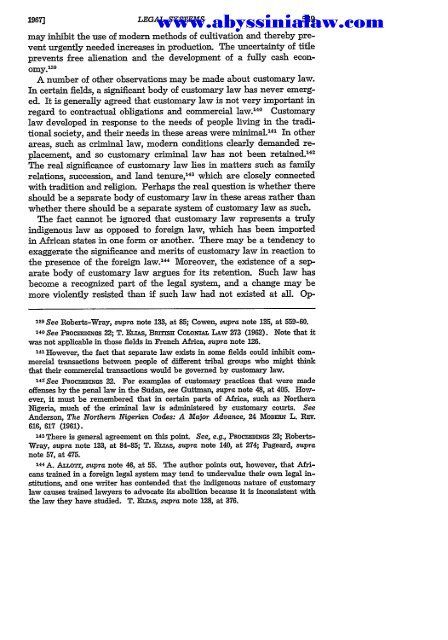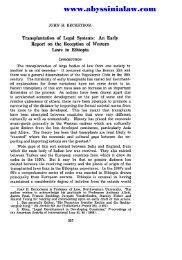You also want an ePaper? Increase the reach of your titles
YUMPU automatically turns print PDFs into web optimized ePapers that Google loves.
1967] LEGAL SYSTEMS<br />
may inhibit the use of modern methods of cultivation and thereby prevent<br />
urgently needed increases in production. The uncertainty of title<br />
prevents free alienation and the development of a fully cash econ-<br />
omy.<br />
3 9<br />
www.abyssinialaw.com<br />
A number of other observations may be made about customary law.<br />
In certain fields, a significant body of customary law has never emerged.<br />
It is generally agreed that customary law is not very important in<br />
regard to contractual obligations and commercial law. 4 Customary<br />
law developed in response to the needs of people living in the traditional<br />
society, and their needs in these areas were minimal.' 4 1 In other<br />
areas, such as criminal law, modern conditions clearly demanded replacement,<br />
and so customary criminal law has not been retained. 42<br />
The real significance of customary law lies in matters such as family<br />
relations, succession, and land tenure, 43 which are closely connected<br />
with tradition and religion. Perhaps the real question is whether there<br />
should be a separate body of customary law in these areas rather than<br />
whether there should be a separate system of customary law as such.<br />
The fact cannot be ignored that customary law represents a truly<br />
indigenous law as opposed to foreign law, which has been imported<br />
in African states in one form or another. There may be a tendency to<br />
exaggerate the significance and merits of customary law in reaction to<br />
the presence of the foreign law. 1 44 Moreover, the existence of a separate<br />
body of customary law argues for its retention. Such law has<br />
become a recognized part of the legal system, and a change may be<br />
more violently resisted than if such law had not existed at all. Op-<br />
139 See Roberts-Wray, supra note 133, at 85; Cowen, supra note 135, at 559-60.<br />
240 See PRocEmm'Gs 22; T. ELIAS, BarrmsH COLONIAL LAw 273 (1962). Note that it<br />
was not applicable in those fields in French Africa, supra note 126.<br />
134 However, the fact that separate law exists in some fields could inhibit commercial<br />
transactions between people of different tribal groups who might think<br />
that their commercial transactions would be governed by customary law.<br />
14 See PROCEEDNnGS 22. For examples of customary practices that were made<br />
offenses by the penal law in the Sudan, see Guttman, supra note 48, at 405. However,<br />
it must be remembered that in certain parts of Africa, such as Northern<br />
Nigeria, much of the criminal law is administered by customary courts. See<br />
Anderson, The Northern Nigerian Codes: A Major Advance, 24 MODERN L. REv.<br />
616, 617 (1961).<br />
143 There is general agreement on this point. See, e.g., PROCEEDnGS 23; Roberts-<br />
Wray, supra note 133, at 84-85; T. ELIAs, supra note 140, at 274; Pageard, supra<br />
note 57, at 475.<br />
144 A. AiLoTT, supra note 46, at 55. The author points out, however, that Africans<br />
trained in a foreign legal system may tend to undervalue their own legal institutions,<br />
and one writer has contended that the indigenous nature of customary<br />
law causes trained lawyers to advocate its abolition because it is inconsistent with<br />
the law they have studied. T. ELIAS, supra note 128, at 376.





